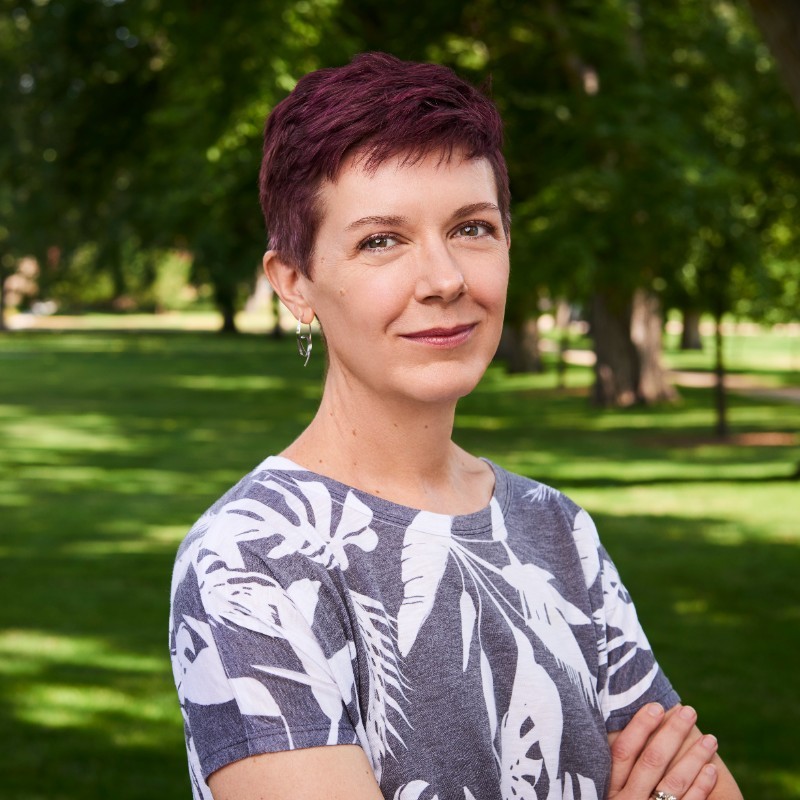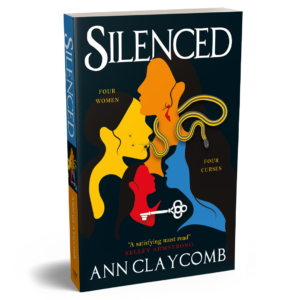As the Director of Faculty Recognition in the College of Liberal Arts, Ann Claycomb plays a key role in elevating our liberal arts community. She works diligently to make sure the CSU community and beyond knows about the wonderful things our faculty are achieving. Following the release of her newest novel Silenced, we are taking the opportunity to highlight Claycomb’s own list of notable personal and creative achievements.
You have an extensive background in writing, including a MA in English Language and Literature and an MFA in Fiction Writing. How did you first get into writing and how did these programs shape your writing career?

I think the central (and unanswerable) question that defines my writing career is “How many books does it take to make a writer?” Because the answer, for me at least, is A LOT. I’ve loved and read fairy tales since I was a little kid, but never thought critically about why so many people love them—and love to read and write retellings of them—until I wrote my Master’s thesis on “Beauty and the Beast.” Yep. My whole argument is that the Beast turning back into a human prince is actually the wrong ending.
My MFA, meanwhile, brought me into contact with some extraordinary teachers and writers, several of whom absolutely pushed me to just be a better writer at the sentence level. But mostly, it forced me to write regularly and produce finished stories; I think that’s the greatest value of any formal writing program.
What drew you to fiction in particular?
As both a reader and a writer, I’m drawn to stories, which are really just narratives of things that happen to characters—but always with an audience in mind. Storytellers want to make us feel and think and react; they want to change us in their telling. Novels, short stories, and other forms of prose fiction are places where we often find really great stories, so that’s why I’m drawn to those genres myself.
Silenced touches on some prevalent social issues – most notably sexual assault in the workplace. Where did you draw your primary inspiration from for this book and what was it like interacting with such nuanced content in your writing process?
So, after my first novel, The Mermaid’s Daughter, came out in 2017, I started brainstorming my second one and I was sort of inexorably drawn to fairy tales again (The Mermaid’s Daughter is a modern-day expansion of Hans Christian Andersen’s “The Little Mermaid.”)I was really interested in a slightly less well-known story called “Toads and Diamonds,” in which two sisters end up spitting things out whenever they talk. The “good” sister spits out diamonds and roses, while her “bad” sister spits out toads and spiders. Feminist critics have pointed out the misogyny and the fear of women’s words in this story for decades, but I hadn’t seen a novel try to actually take it on more literally, using the kind of magical realism I write. The problem was that I didn’t know what story I wanted to tell in which a woman would be cursed to spit these horrible things out of her mouth.

Then the Weinstein accusations came out. Then came Matt Lauer, Bill O’Reilly . . . Bill Cosby’s trial. And it struck me that these powerful men really assault women twice, first physically and then emotionally and psychologically, through the threats and intimidation that keep so many women silent—sometimes for years. And I just saw clearly a scenario in which one such man literally curses the women he assaults using fairy tale elements.
It was hard to write, for a number of reasons. For one thing, I felt a tremendous amount of pressure to get it right and make it clear that every woman who deals with sexual assault has a different experience. That’s why there are multiple main characters in Silenced, and even more women’s stories that we learn along the way. It also felt so urgent, and like I couldn’t write fast enough to even keep up. I wrote one chapter literally sitting in my living room with the Kavanaugh confirmation hearings on in the background. I was also very clear that I did not want to portray these women as seeking revenge. That storyline has been done a lot—think Girl with the Dragon Tattoo or the film Promising Young Woman—and I think it lets predators off easy by suggesting that if survivors had the chance to behave just as badly, they’d take it. That’s just not true. Survivors want justice and they deserve it.
Your other novel, The Mermaid’s Daughter – a modern-day expansion of Hans Christian Andersen’s The Little Mermaid – showcases a much different approach to fictional content compared to Silenced. How was the writing process similar or different when writing these novels?
Writing The Mermaid’s Daughter took me 10 years. Two of my main characters are opera singers, while another is a classical composer, so I had to learn the basics of the opera world and try to teach myself how to write about music so the reader can have at least some sense of what it sounds like. That was incredibly hard. I also sent my characters to Ireland at one point in the book, so I went on a research trip where I got soaked to the skin wandering Inishmore in the pouring rain, then violently seasick on the ferry ride back to the mainland—all of which made it into the book. I also wrote this novel while raising two toddlers, then two little kids and a baby, and getting my MFA. In the end, it’s the book I wanted to write and I’m very proud of it.
Silenced, on the other hand, felt like I was trying to ride a monster in a way. I wrote the first draft relatively quickly (for me)—in less than three years, then sent it out. And meanwhile, the horrible #MeToo revelations just kept coming out. By the time I revised the manuscript last summer, I was writing in a post-Dobbs world, and under the weight of a lot of proof that powerful men can and do still silence women—in the workplace and elsewhere—all the time. So, I just tried to keep the story as relevant as possible and also make the points as clearly as I could, both about how women get silenced and how they take their voices back.
What are some tips and tricks you have gathered in your fiction writing experience and what advice would you give to aspiring fiction writers?
I’d offer two pieces of advice to aspiring writers, for what it’s worth. The first is just to learn to get to the end. Starting a story or a novel is fun, it’s exciting, it’s energizing—until suddenly you’re on page 10 or Chapter 3 and you look ahead and it’s like there’s a sheer rockface in front of you with no handholds and no summit in sight. That’s the moment when you have to take a deep breath and just start climbing.
The other is a lot easier, I hope, which is to write what you yourself love to read. If you love Regency romance novels, don’t try your hand at a bleak, Cormac McCarthy-style story of the American West. You’ll hate it, and chances are you won’t get it right either, because you hate it. Just write a Regency romance, for heaven’s sake, and have fun!
Anything else you’d like to share?
Silenced came out in the U.S. the day before the E. Jean Carroll verdict was announced. That timing drives home so much of what I was writing about in this book. Carroll was absolutely silenced by Trump—and when she did come forward, people simultaneously criticized her for not doing it sooner and sneered that she only did it for money. And Trump’s claim that Carroll was “a nut job” is absolutely a version of “there’s no way this is true, she’s just crazy,” which the CEO in Silenced has down to an art form. But in the end, Carroll persevered, told her story, and guess what? The jury was listening.